- Home
- Maggie Stiefvater
The Dream Thieves Page 12
The Dream Thieves Read online
Page 12
Page 12
Time was a circle, a rut, a worn tape Ronan never tired of playing.
The voices whispered to him: Gratias tibi ago. Thank you. The girl said, “Don’t forget the glasses!”
Ronan followed her gaze. Between the flowers and broken
vines and fallen leaves was a gleaming white object. When he plucked it free, Kavinsky’s sunglasses looked back at him, eyeless. He ran his thumb over the smooth surface of the plastic, fogged his breath over the tinted lenses. He did it until he could feel even the etched circle of the tiny screw in the earpiece. Dream to memory to reality.
He lifted his eyes to the girl. She looked afraid. She always looked afraid, these days. The world was a scary place.
She said: “Take me with you. ”
He woke up.
That night, The Gray Man dreamt of being stabbed.
At first he felt each individual wound. Particularly that first one. He was unbroken and entire, and then that wholeness was stolen by that thief, the knife. So that piercing was the worst. A half inch above his left collarbone, pinning him to the ground for half a breath.
Then, again, but closer to the knob of his shoulder, glancing off his collarbone. And then two inches below his belly button. The word gut was a verb and a noun. Another cut and another cut. Slippery.
Then the Gray Man was the assailant. The hilt of the knife was ridged and permanent in his hand. He’d been stabbing this piece of meat for a lifetime. He’d been born when it started and he’d die when he was done. It was the bite that kept him alive: the moment the blade parted a new inch of skin. The resistance and then nothing. Catch and release.
Then the Gray Man was the knife. He was a blade in the air, gasping, and then he was a weapon inside, holding his breath. He was voracious, chewing, never satisfied. Hunger was a species, and he was the best of that kind.
The Gray Man opened his eyes.
He looked at the clock.
He rolled over and went back to sleep.
That night, Adam didn’t dream.
Curled on the mattress, he covered his face with his summerhot arm. Sometimes, if he blocked his mouth and nose, just this side of suffocation, sleep would overthrow him.
But both regret and the memory of the brief apparition kept slumber at bay. The wrongness, the deadness, of the woman still hung in the air of the room. Or maybe inside him. What did I do?
He was awake enough to think of home — It’s not home, it was never home, those people didn’t exist, and if they did, they were nothing to you — and to think of Blue’s face when he lost his temper. He was awake enough to recall precisely the smell of the forest as he sacrificed himself. He was awake enough to wonder if he’d been making bad decisions for his entire life. If he’d been a bad decision, himself, even before he was born.
He wished summer was over. At least when he was at Aglionby he could turn over his papers to see the grades, concrete proof of his success at something.
He was awake enough to think of the invitation from Gansey. There might be an internship in there. Adam knew it was a favor. Did that make it wrong? He’d said no for so long that he didn’t know when to say yes.
And maybe , a tiny, watchful part of his mind said, maybe it will be for nothing anyway. When they smell the Henrietta dirt beneath your fingernails.
He hated the careful way Gansey had asked him about it. Tiptoeing, just like Adam had learned to tiptoe around his father. He needed a reset button. Just push the reset button on Adam Parrish and start him again.
He didn’t sleep and when he did, he didn’t dream.
12
The following morning, Blue was perusing school summer reading when her aunt Jimi brought a plate full of smoldering plant matter through her bedroom. Jimi,
Orla’s mother, was as tall as Orla, but several times wider. She had all of Orla’s grace, too, which was to say that she knocked her hips into every piece of furniture in Blue’s room. Every time she did, she said things like “mother lover!” and “fasten it all. ” They sounded worse than real swear words.
Blue lifted her bleary eyes from the page, her nostrils smarting from the smoke. “What are you doing?”
“Smudging,” Jimi answered. She held the plate in front of the canvas trees Blue had stuck to her walls and blew on the bound herbs to direct the smoke at the art. “That terrible woman left so much bad energy. ”
The terrible woman was Neeve, Blue’s half aunt, who had disappeared earlier that year after practicing black magic in their attic. And smudging was the practice of using the smoke of sympathetic herbs to clear negative energy. Personally, Blue had always thought there must be better ways to get on a plant’s good side than by setting it on fire.
Now Jimi waved the lavender and sage in Blue’s face. “Sacred smoke, cleanse the soul of this young woman before me and give her some common sense. ”
“Hey!” Blue protested, sitting up. “I think I’m very sensible, thanks! There isn’t mugwort in that, is there? Because I have things to do!”
Jimi said mugwort improved her clairvoyance. She didn’t seem to mind its temporarily mind-altering affects. Sullenly, sounding just like Orla, she said, “No, your mother wouldn’t let me. ”
Blue silently thanked her mother. Gansey and Adam were supposed to be coming over, and the last thing she wanted was to be responsible for getting them mildly high. Although, she thought with more than a little discomfort, Adam might be improved by something that took the edge off. She wondered if he was ever going to say sorry.
“In that case,” she said, “would you do my closet, too?” Jimi frowned. “Was Neeve ever in there?”
“With Neeve,” Blue replied, “you never know. ”
“I’ll say an extra little prayer in there. ”
The little prayer turned out to be a little longer than Blue
had expected, and she fled the smoke after a few minutes. In the hallway, she discovered Jimi had already opened the attic door in preparation for smudging Neeve’s old quarters. It felt like an invitation.
With a glance down the hall, she stepped into the stairwell and climbed. Immediately, the air warmed and began to stink. The grubby smell of asafetida, one of the charms Neeve had used, still permeated the space, and the attic’s summer heat did nothing to improve upon it.
At the top of the stairs, she hesitated. Most of Neeve’s things were still up here, but they’d been heaped and boxed on the throw-covered mattress for later removal. All of the masks and symbols had been removed from the slanted, unfinished walls, and the candles had been carefully packed taper-side down in a plastic bin. But Neeve’s mirrors were undisturbed — two fulllength mirrors pointed directly at each other. And there was a deep black bowl sitting on the floor beside them. Neeve’s scrying bowl.
The base was slicked with the memory of recent liquid, even though Neeve hadn’t been in this room for nearly a month. Blue wasn’t sure who else would use it. She knew that Maura, Persephone, and Calla generally frowned upon the ritual. The technique was theoretically simple: The scryer looked into a mirror or dark bowl full of liquid, drew her mind into a space outside itself, and saw the future or another location in the reflection.
In practice, Maura had told Blue that it was unpredictable and dangerous.
The soul, she’d said, is vulnerable when it’s outside the mind.
The last time Blue had seen this bowl, Neeve had been scrying into someplace hidden on the ley line. Possibly somewhere in Cabeswater. And when Blue had interrupted her, she’d found Neeve possessed by whatever dark creature she’d discovered there.
Now, in the attic’s suffocating heat, Blue shivered. It was easy to forget the terror that had accompanied their hunt for Cabeswater. But the shiny circle in the base of the scrying bowl brought it all back in a second.
Who’s using you? Blue wondered. And of course, that was only the first half of the question.
The other half was: And what are you looking for now?
Once, he’d seen the devil. It had been a low, late morning at the Barns when the sun had burned off the mist and then burned off the chill and then burned the edges off the ground until everything shimmered with heat. It never got hot in those protected fields, but that morning, the air sweated with it. Ronan had never seen cattle pant before. All of the cows heaved and stuck their tongues out as they frothed with the heat. His mother sent Ronan to put them in the shade of the cattle barn.
Ronan had gone to the searing metal gate, and as he did, he’d glimpsed his father, already in the barn. Four yards away from him had stood a red man. He was not truly red, but the burned orange of a fire ant. And he was not truly a man, because of the horns and the hooves. Ronan remembered the alienness of the creature, how real it had been. Every costume in the world had gotten it wrong; every drawing in every comic book. They’d all forgotten that the devil was an animal. Looking at the red man, Ronan had been struck by the intricacy of the body, how many miraculous pieces moved smoothly in harmony, no different than his own.
Niall Lynch had had a gun in hand — the Lynches had an enormous number of guns of all sizes — and just as Ronan had opened the gate, his father had shot the thing about thirteen times in the head. With a shake of its horns, the unharmed devil had presented its genitalia to Niall Lynch before bounding off. It was an image that had yet to leave Ronan.
And so Ronan became a reverse evangelist. The truth burst and grew inside him, and it was laid upon him to share it with no one. No one was meant to see hell before they get there. No one should have to live with the devil. So many homilies on faith were ruined once you no longer required it for belief.
Now it was Sunday, and as with every Sunday, he was headed to St. Agnes. Gansey wasn’t with him — he belonged to some religion that only required church attendance on Christmas — but Noah came with. Noah had not been Catholic when he was alive, but recently he had decided to find religion. No one in the church ever noticed him and it was possible God didn’t, either, but Ronan, as someone God possibly ignored as well, didn’t mind the company.
Today, Ronan grimly stepped through the great old doors and clawed some holy water from the font while the choir members narrowed their eyes at him. He scanned the pews for Declan. It was the devil who drove him to church every Sunday, but it was his brother Matthew who drove him to a pew beside Declan.
His older brother sat in the rearmost pew, the knob of his skull resting on the wood, his eyes closed. As always, he’d dressed for church: collared shirt white as innocence, knot of his tie tight and sanctified, slacks obediently pressed. This week, however, Declan had zombie bruising beneath both of his eyes, a terrifically red, sutured split across a cheekbone, and a decidedly broken nose.
Ronan’s mood improved. He flicked holy water onto Declan’s face from his still-damp fingers. “What the hell happened to you?”
The two women sitting three pews forward whispered to each other. The organ murmured in the background.
Declan didn’t open his eyes. “Burglary. ” He muttered it with as little effort as humanly possible, opening his mouth only wide enough for the word to escape.
Ronan and Noah exchanged a look.

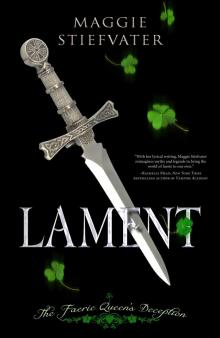 Lament: The Faerie Queens Deception
Lament: The Faerie Queens Deception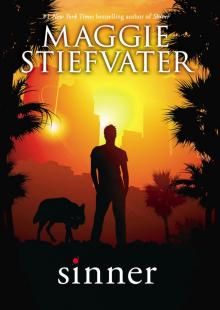 Sinner
Sinner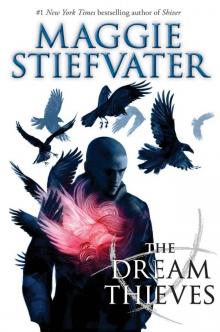 The Dream Thieves
The Dream Thieves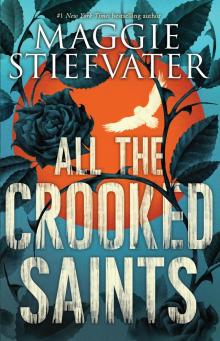 All the Crooked Saints
All the Crooked Saints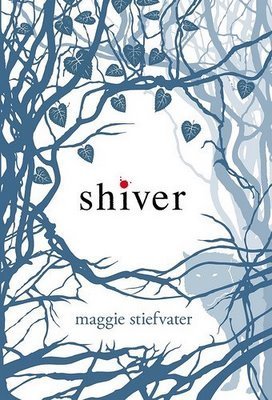 Shiver
Shiver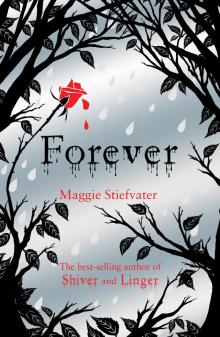 Forever
Forever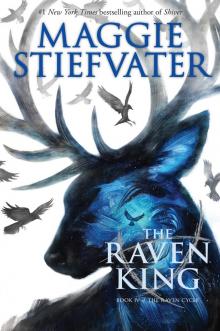 The Raven King
The Raven King Opal
Opal Linger
Linger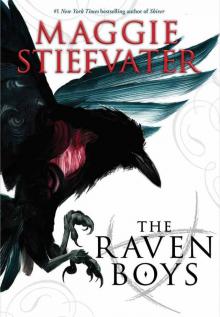 The Raven Boys
The Raven Boys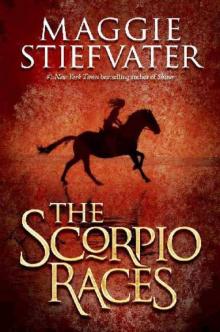 The Scorpio Races
The Scorpio Races Hunted
Hunted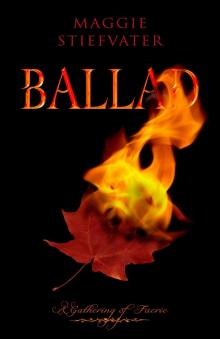 Ballad: A Gathering of Faerie
Ballad: A Gathering of Faerie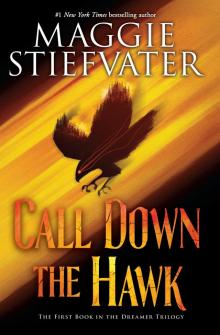 Call Down the Hawk
Call Down the Hawk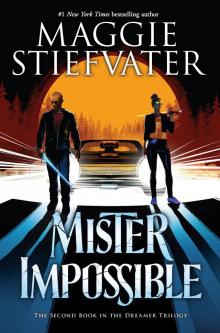 Mister Impossible
Mister Impossible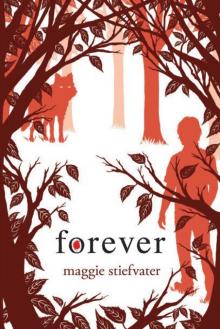 Wolves of Mercy Falls 03 - Forever
Wolves of Mercy Falls 03 - Forever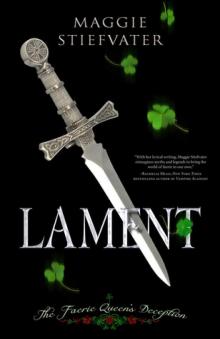 Lament
Lament![Maggie Stiefvater - [Wolves of Mercy Falls 02] Read online](http://i1.bookreadfree.com/i1/04/04/maggie_stiefvater_-_wolves_of_mercy_falls_02_preview.jpg) Maggie Stiefvater - [Wolves of Mercy Falls 02]
Maggie Stiefvater - [Wolves of Mercy Falls 02]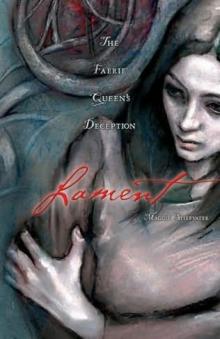 Lament: The Faerie Queen's Deception
Lament: The Faerie Queen's Deception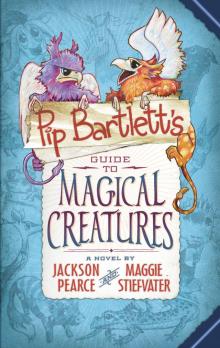 Pip Bartlett's Guide to Magical Creatures
Pip Bartlett's Guide to Magical Creatures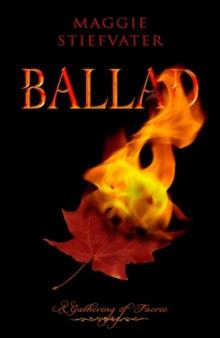 Ballad
Ballad